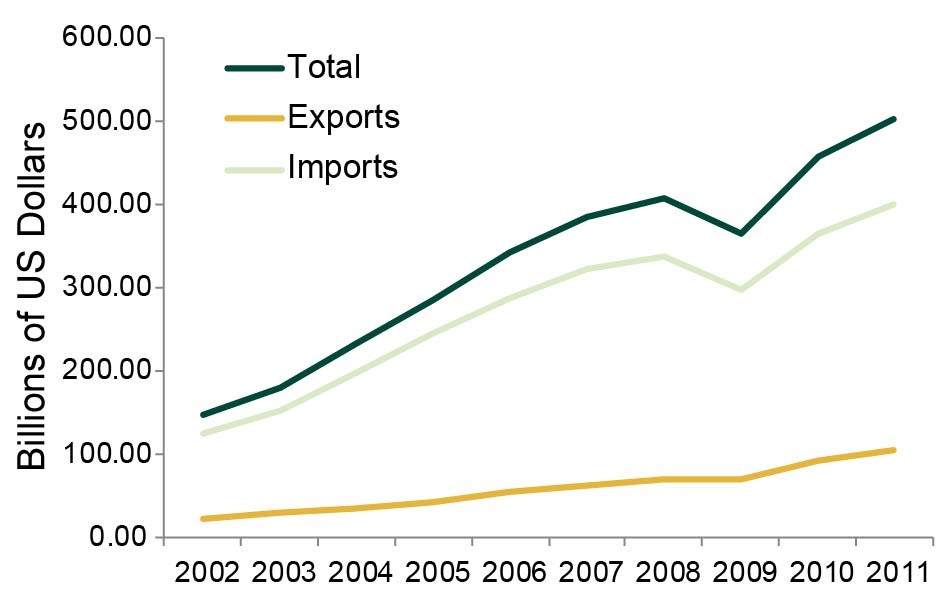Personal Wealth Management / Economics
Trade Tussle
The US and China’s trade relationship got a bit frostier Monday, but minor spats between the two haven’t much impacted bilateral trade over the past decade.
The US and China’s trade tiff heated up a bit Monday when each nation filed a new WTO claim against the other, bringing their combined 2012 complaint tally to five.
For those who haven’t kept score, the US (along with Japan and the EU) shot first in March, when it complained about China’s restrictions on rare earth mineral exports—essentially claiming China was purposefully limiting supply to increase prices (China claims it’s exercising sustainable resource management). Since then, China and the US have primarily tussled over dumping—subsidizing exports so they can be sold cheaply abroad to gain market share, which the receiving countries argue harms their domestic producers. Dumping is banned by the WTO, and many countries impose countervailing “anti-dumping” duties on goods from countries they believe violate the ban. In May, China challenged US anti-dumping duties on certain unspecified products, and the US complained about Chinese anti-dumping duties on US cars in July. Now, China’s complaining about US anti-dumping duties on 24 products, including kitchen appliances and paper, and the US is accusing China of dumping auto parts.
Whether either nation is dumping anything in the other is for the WTO to decide. Certainly industries in both nations have benefited from subsidies and other government-backing, but each may have trouble arguing the other’s sole aim in subsidizing was undercutting end-market producers. Both could argue they merely sought to stimulate domestic production or aid a struggling industry, with extra-competitive exports an unintentional byproduct. We’d argue neither subsidies nor any other means of propping up industry—including anti-dumping duties—is the best approach to managing domestic industry, but that’s a topic for another day. The WTO isn’t really concerned with whether either nation has sound economic policy—just whether they’re breaking its rules.
That said, it’s possible neither nation cares much about the verdicts—WTO complaints are often a political tactic to curry favor at home. Appearing to take action may be a bigger aim for both sides than actually forcing a change in the other’s trade policies.
Especially in an election year for both nations. China tends to be a hot-button issue in US elections—both candidates talked tough on China’s trade practices in 2008. And in 2004, there was ample jawboning about China’s undervalued currency. Both current candidates have been rather hawkish about China’s trade policies recently, and it’s likely not a coincidence the US filed its latest complaint as President Obama began a tour of US auto parts manufacturers. Meanwhile, China’s Communist Party is facing its twice-a-decade shifting of political players. Showing they’ll help “protect” Chinese manufacturers from unfair duties is likely just one way the party tries to boost popular support for the incoming leadership.
Frosty as US-China trade relations may appear though, there hasn’t been much visible impact on actual trade. Since China joined the WTO in 2002 and including Monday’s filings, the US has complained about China 15 times, and China’s filed 8 grievances against the US. Yet over this period, US exports to, imports from and total trade with China have more than tripled—from $22.1 billion, $125.2 billion and $147.3 billion, respectively, in 2002 to $103.9 billion, $399.4 billion and $503.3 billion in 2011, as shown in Exhibit 1. And through July, 2012’s trade has outstripped 2011’s.
Exhibit 1: US Trade With China (Nominal)
Source: US Census Bureau.
While anything could happen looking forward, if petty grievances haven’t yet significantly cut into the US’s trade with China, it’s tough to imagine their suddenly starting to now—there doesn’t appear to be a catalyst for such a change. Creeping protectionism bears watching, but for now, it seems unlikely squabbling over tit-for-tat duties on tires, chickens, solar panels or car parts puts a huge dent in global trade.
If you would like to contact the editors responsible for this article, please message MarketMinder directly.
*The content contained in this article represents only the opinions and viewpoints of the Fisher Investments editorial staff.
Get a weekly roundup of our market insights
Sign up for our weekly e-mail newsletter.

You Imagine Your Future. We Help You Get There.
Are you ready to start your journey to a better financial future?

Where Might the Market Go Next?
Confidently tackle the market’s ups and downs with independent research and analysis that tells you where we think stocks are headed—and why.






